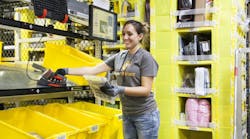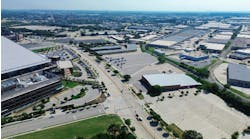Jeff Bezos blinked.
Bowing to political pressure, he announced plans Tuesday to raise the minimum wage for all Amazon.com Inc. employees in the U.S. and U.K.
Effective Nov. 1, the company will offer $15 an hour to more than 250,000 current employees in the U.S. along with 100,000 more seasonal workers who will be hired during the holidays, Amazon said..
The hourly minimum wage in the London area will rise to 10.50 pounds (US$13.60), and 9.50 pounds in the rest of the U.K., affecting some 37,000 current and seasonal employees, according to a separate statement.
“We listened to our critics, thought hard about what we wanted to do, and decided we want to lead,” CEO Bezos said. “We’re excited about this change and encourage our competitors and other large employers to join us.”
The e-commerce behemoth has been hit by lawsuits in recent years alleging that it has used contract employees to skirt regulations and cut costs in the U.S. and abroad. Vermont Senator and former presidential candidate Bernie Sanders has charged that Amazon pays its workers such a low wage that many of them have to apply for public assistance.
Amazon, like other retailers, is also responding to a tight U.S. labor market. Earlier this year, Walmart Inc. boosted its starting hourly wage to $11 an hour. Target Corp. last year increased its minimum hourly wage to $11 and bumped that to $12 this year, with the goal to reach $15 by the end of 2020. Costco Wholesale Corp. and other retail chains like TJX Cos. have also raised wages in recent years. Amazon’s pay hike includes workers at Whole Foods, which the company acquired last year.
Bezos, the world’s richest man, is getting a lot of public relations bang for the buck. Analysts don’t expect the wage hike to have much impact on costs. Based on expected revenue for next year, according to Loop Capital Markets LLC analyst Anthony Chukumba, the hike will add $1 billion to $2 billion in incremental costs.
“It may sound like a lot of money,” he said. “But in the context of how big Amazon is, it doesn’t move the needle a whole heck of a lot.” Meanwhile, Amazon is using more robots in warehouses, which should slow hiring growth and help the company keep payroll expenses in check.
The political pressure on Amazon has been ratcheting up in recent months. Sanders introduced a bill last month that would tax Amazon, Walmart Inc. and other big employers whose workers collect public assistance. If the companies paid a living wage, U.S. taxpayers would save $150 billion a year on government assistance programs, such as food stamps, Medicaid and public housing, Sanders argues. The bill is called the stop Bad Employers by Zeroing Out Subsidies Act -- or Stop BEZOS.
In a blog post responding to Sanders at the time, Amazon said it created 130,000 new jobs last year and that employees receiving food stamps include those who work part-time or only worked at Amazon for brief periods.
Amazon said on Oct. 2 that company lobbyists will also begin advocating for an increase in the U.S. federal minimum wage, which has been $7.25 an hour since 2009. Amazon’s new U.S. wage implies an annual income of about $31,200 for a 40-hour-per week worker. The U.S. income poverty threshold for a family of four is about $25,000, according to 2017 Census bureau figures.
“Today I want to give credit where credit is due,” Sanders said. “And I want to congratulate Mr. Bezos for doing exactly the right thing.” The Senator said he looks forward to working with Bezos on a bill to raise the federal minimum wage.
Bezos’ actions, as “one of the most significant, important corporate leaders in this country, that’s going to reverberate around the corporate world,” Sanders said in an interview. He said he has “no doubt” that other profitable corporations -- in the fast food industry, the airlines and retail -- will follow suit.
By John Lauerman and Jeremy Kahn



